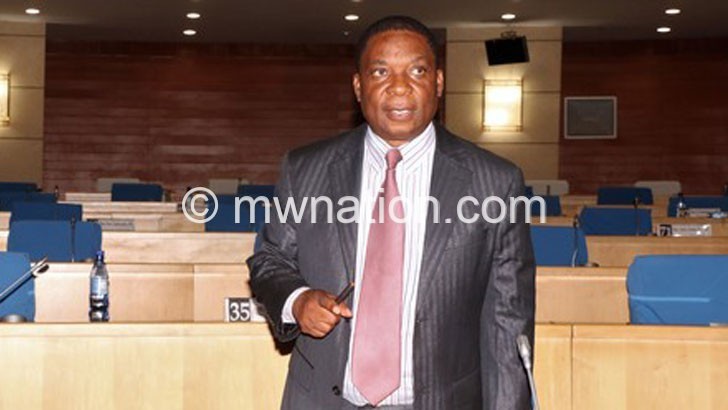‘House bulldozed’
Some opposition legislators have accused the Executive of bulldozing bills through the august House by waiving Standing Orders, a move they argue negatively impacts the deliberations in the National Assembly.
But Leader of the House Richard Chimwendo-Banda wondered how that can be the case when at the time a bill is presented to the House, the committees and leadership of the House will have already scrutinised and given directions on it.
Leader of Opposition Kondwani Nankhumwa, Rumphi East legislator Kamlepo Kalua (independent) and his Mulanje Bale counterpart Victor Musowa of the Democratic Progressive Party (DPP) are some of the members of Parliament (MPs) who feel continuously waiving the Standing Orders has a negative bearing on the quality of deliberations.
Parliamentary Standing Orders state that a copy of any bill should be circulated to each parliamentarian 28 days before its first reading in the House.
It further says, in the circumstance that the bill is urgent, it must have been circulated for seven days before the minister in charge can waive the 28-day notice. However, this has not always been the case.

During the just-concluded eight-week first meeting of the 50th Session of Parliament, the MPs passed 14 constitutional and money bills, which Musowa allegesthat more than half the parliamentarians did not fully grasp.
“The 28-day notice is supposed to be respected because those Standing Orders were formulated for a reason. They knew bills come in different forms; some are complicated requiring technical consultations, while others are easy.
“Parliament is made of MPs with different backgrounds and capacities. Some bills we pass into laws in the House have taken almost eight years for technocrats to develop. They also take several months for the Cabinet to approve and it doesn’t make sense for authorities to bring them to Parliament and expect the MPs to pass it within days; it is totally wrong.”
Said Musowa: “There are MPs who have said ‘yes’ to a bill without understanding its contents and when complications emerge they start wondering how such a bill was passed but it’s because someone rushed it for their own interest.”
While describing the tendency as unfortunate, Nankhumwa observed the Government side uses its numerical strength to pursue its own agenda.
He observed the constant waivers have a huge negative bearing on the quality of deliberations conducted in the House, arguing that the trend denies MPs ample time to fully scrutinise and understand the contents of the proposed legislation before debate resulting in rushed adoption.
Nankhumwa cited a Financial Bill (Bill No. 11 of 2023: NBS Bank PLC and National Bank of Malawi PLC [Lake Malawi Water Supply Project] Loan Authorisation], passed on April 6, where government wants to borrow K105 billion from the two local banks.
He said: “The Bill was circulated at 9.40am electronically. Using government’s numerical strength they moved a motion for the production of a supplementary order which was passed. Consequently, the Bill was brought on the floor and got passed the same day amid protests from the opposition. How would members deliberate on a Bill which has just been circulated?”
In a separate interview on Wednesday, Kalua warned fellow MPs to be careful when passing bills just to suit their interests.
“These very same laws we are making today using shortcuts without following the standing orders and foundations of democracy will one day haunt us,” he warned.
Kalua observed that the central responsibility of MPs is to debate, amend and pass laws but “deliberate circumvention” of the rules impacts on the proceedings because MPs are not able to appreciate the technicalities of the bills.
He said the challenge was the existence of too many ‘yes’ MPs that lost their independence in representing their constituencies and cannot pass legislation that has significant economic impact while holding governments to account on behalf of citizens.
Governance expert Mavuto Bamusi observed on Wednesday that the practice weakens Parliament’s constitutional mandate as it erodes the oversight function, undermines representation role and reduces the legislative task into a mere rubber-stamp.
“The implication is that parliamentary democracy is decoupled while governance is destabilised. Ultimately, development is undermined.
But Chimwendo Banda wondered in an interview how the waiver poses a threat because by the time it is presented to the House the committees and leadership of the House will have already scrutinised and given directions on it. This excludes money bills which do not go to the committees for scrutiny.
He said procedurally, before a bill is presented to Parliament for debate, it is first shared among the relevant parliamentary committees and political parties’ leadership for scrutiny. The committees also produce a report on the bill.
There are currently 20 different committees in the august House.
According to Chimwendo-Banda, in the circumstance that a bill is urgent and the 28-day rule is not fulfilled, the bill is still circulated for seven days before the minister in charge can waive the 28-day notice.
Said Chimwendo-Banda: “No matter the circumstances, these two standing orders are respected. But if the 28 days is waived, the bill is circulated for seven days after relevant parliamentary committees have been taken through the bill for scrutiny.”
People’s Party whip in Parliament, who is also the party’s spokesperson Ackson Kalaile-Banda, defended the waivers, arguing that “serious MPs” can always go through the bills and effectively contribute during debates.
“People will always complain and talk against something because of politics. A bill cannot be waived before seven days after circulation so within that period somebody should be able to read the bill, understand and debate constructively,” he said.





